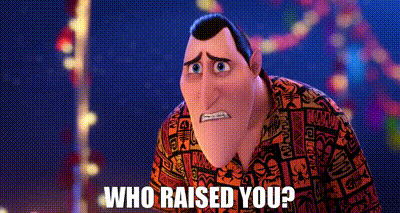
In the whole “show don't tell” thing that is the holy grail of ‘good storytelling’ (yes but not always, this is for a newspost of another time) what they usually don't tell you is that behavioral patterns are your friend.
To show rather than tell, you need to give your character little mannerisms and behavioral patterns that will get across to your audience a range of things, from what their temperament is to what they like and don't like.
And in these mannerisms, you can also allow their upbringing to show.
What constitutes upbringing?
Upbringing is the set of rules, instructions, admonitions, and approaches to the world, society, and yourself that your parents give you.
How do you let it show?
Well, first you'd need to know who the parents (or parental figures or parental influences) were for your character. Even if they are an orphan, they will always have parental figures. That doesn't mean they're going to have good parental figures, but they'll have them nonetheless.
Children always ‘lift’ behavioral patterns of the parents/parental figures. If your parents spoke a certain way, chances are you are, too. Methodologies applied in the household are often the same one applied by the children in theirs. So you could show that a character comes from a household where table manners were important by having them place a napkin (paper or not) across their lap before they eat even if they're at McDonald's.
Or you could have them refrain from cussing in front of people younger than themselves. This could be because a) their parents did it too and they've learnt it from imitation or b) their parents didn't do it, and it was so traumatic to the character that they swore never to do it to someone else.
And this is where you would need to decide the relationship between the character and their parental figure. Was it harmonious or confrontational? Was communication good or bad? What skills were passed down non-verbally from the parents? All of these can show in how your character behaves instinctively while other things are happening. (The napkin over the lap can be placed as they're talking about how to solve a problem that has nothing to do with anyone's parents or background)
A character may hate that they have patterns they inherited from their parental figures and may be struggling to break them. For example, a character with a gambling addiction may have ended up in the casino in an effort not to give in to drug use like their parent. Or they may be clean of all addictions and extremely intolerant of anything that can remotely be addictive, out of sheer terror that they may end up like their parent.
The way of joking, or the way of giving (or not giving) advice is often part of how a character's upbringing shaped them. Same goes about a whole lot of things, from how methodical they are in research to how impatient they are if forced/required to teach someone something.
If you know what your character's upbringing was, you yourself will naturally expect it to show in how that character acts or reacts or behaves. So it pays dividends to take the time and decide how your story's major players were raised and by whom.
Would they be the exact same person if they were raised by nurturing, loving parents compared to neglectful parents, narcissists, or abusers?
If you answered “no” then you're on your way to showing a whole lot more than you will ever tell in every single panel if you wish.
Special thanks to The Doodler for giving me the idea for this newspost! Check out her amazing comic The Second Crimean War!
Don’t forget you can now advertise on DrunkDuck for just $2 in whichever ad spot you like! The money goes straight into running the site. Want to know more? Click this link here! Or, if you want to help us keep the lights on you can sponsor us on Patreon. Every bit helps us!
Special thanks to our patrons!!




Justnopoint - Banes - RMccool - Abt_Nihil - Gunwallace - PaulEberhardt - Emma_Clare - FunctionCreep - SinJinsoku - Smkinoshita - jerrie - Chickfighter - Andreas_Helixfinger - Tantz_Aerine - Genejoke - Davey Do - Gullas - Roma - NanoCritters - Teh Andeh - Peipei - Digital_Genesis - Hushicho - Palouka - cheeko - Paneltastic - L.C.Stein - dpat57 - Bravo1102 - The Jagged - LoliGen - OrcGirl - Miss Judged - Fallopiancrusader - arborcides - ChipperChartreuse - Mogtrost - InkyMoondrop - Jgib99 - Hirokari - Orgivemedeath Ind - Mks Monsters - GregJ - HawkandFloAdventures

Character Upbringing
Tantz_Aerine at 12:00AM, June 17, 2023
6 likes!


©2011 WOWIO, Inc. All Rights Reserved Mastodon





rickrudge at 9:53AM, June 18, 2023
Ha ha ha. My detective Tag Forester character sometimes gets "words of wisdom" (?) from his late Grandpa Forester, a crusty old-school detective that has some sage advice from “the bad old days” about relationships. It’s usually Dutch uncle advice; red pill and other stuff. Some of it, Tag forwards on to his clients, and some of it, he choses not to follow at all.
davidxolukoga at 11:31PM, June 17, 2023
This is a constant in A24 movies
Andreas_Helixfinger at 1:23AM, June 17, 2023
Upbringing is actually one of the central themes in my comic Molly Lusc. Throughout the comic readers are going to see the different events, traumas and parental figures in Molly's upbringing and the ways they've shaped her into the split person she is. How she can be both genuinely compassionate, but also callous towards people at the same time. Her behavoural patterns such as sleeping in the bathtub, stealing from people out of mere compulsion, avoiding cussing in other people's presence and always eating spate rolls, a national dish in her home country, in old, traditional manner and comment on how foreign someone is by how improperly they're eating their spate roll.
marcorossi at 12:50AM, June 17, 2023
I like the idea of explaining some character behaviour through the relationship with their parental figures: for example, in a fantasy or middle ages themed comic, the bad guy, an inquisitor, might be extremely rigid, but this behaviour can be explained by the fact that e.g. he had a really nasty life because in his youth his noble family was a nest of vipers because siblings plotted against each other to get the power, whereas he was sent to a monastery that was very rigid but at least people weren't knifing each other in the back. This kind of thing is useful to have e.g. bad guys that are believable and relatable while still being very bad. However sometimes it seems to me that I'm just shifting the problem: this guy does X because his father did X too; yes but why did his father do X? The question is still there.